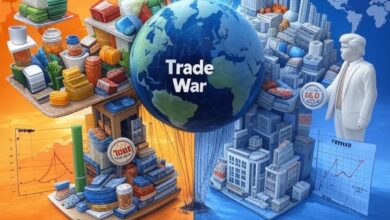AI Virtual Assistants Surpass Human Population: 8.4 Billion and Counting
A Year of Transformation : How AI and Modern Tech Are Reshaping Lives and the Future

April 01, 2025 – Over the past year, humanity has witnessed an unprecedented surge in life-changing technologies, with artificial intelligence (AI) at the forefront. From advanced models like Grok (developed by xAI), DeepSeek’s innovative offerings, and OpenAI’s ChatGPT evolutions, to breakthroughs in biotechnology, quantum computing, and sustainable energy, 2024 has been a pivotal year. These advancements are not just reshaping daily life but are poised to become indispensable global assets within the next five to ten years, overtaking traditional methods and redefining how we work, live, and interact.
A Year of AI-Powered Revolution
Since April 2024, AI has taken giant leaps. Grok, designed to provide insightful and truthful answers, introduced features like real-time data analysis and enhanced user interaction, making it a go-to tool for professionals and curious minds alike. DeepSeek, a Chinese startup, stunned the world with its R1 model in January 2025, offering high-performance reasoning at a fraction of the cost of Western competitors, followed by an accelerated R2 release in early 2025. Meanwhile, ChatGPT’s GPT-4o brought multimodal capabilities—text, images, and more—into mainstream use, embedding AI deeper into creative and analytical tasks.
These AI systems have infiltrated industries rapidly. In healthcare, AI-driven tools like ECgMLP have improved cancer detection accuracy, while personalized medicine powered by AI-biotech convergence has begun tailoring treatments to individual genetic profiles. In education, AI tutors adapt to student needs, offering personalized learning experiences that outpace traditional classroom methods. Creative sectors, too, have embraced AI, with tools generating art, music, and literature indistinguishable from human creations.
Beyond AI, 2024 saw quantum computing inch closer to practicality, with companies like Google and IBM enhancing computational power for complex problem-solving in fields like cryptography and materials science. Sustainable tech also advanced, with innovations like BCOOLER, an AI-driven energy optimization model, reducing carbon footprints in industrial sectors.
Impact on Daily Life
The past year has brought tangible changes. AI-powered virtual assistants, now numbering over 8.4 billion globally, outstrip the human population, handling everything from scheduling to customer service. In transportation, autonomous vehicles, bolstered by Tesla’s Autopilot upgrades, are becoming more reliable, hinting at a future where self-driving cars dominate roads. At home, wearable AI devices—projected to hit a $180 billion market in 2025—monitor health metrics with unprecedented precision, alerting users to potential issues before they escalate.
Workplaces have transformed too. Generative AI tools like GitHub’s Copilot and Salesforce’s Agentforce have boosted productivity by 20-40% in fields like software development and customer service, automating mundane tasks and freeing humans for creative problem-solving. Journalism, exemplified by The Associated Press’s use of AI for earnings reports, is seeing a shift toward data-driven storytelling.
The Global Takeover: Five to Ten Years Ahead
The trajectory of these technologies suggests they will become unavoidable assets globally within the next decade. Here’s how:
- Ubiquitous AI Integration: By 2030, AI adoption is projected to grow at a compound annual growth rate (CAGR) of 35.9%, with 63% of organizations already planning implementation within three years. As AI becomes cheaper—thanks to models like DeepSeek’s—small businesses and developing nations will adopt it, leveling the playing field. Traditional manual processes, from accounting to manufacturing, will be overtaken by AI-driven automation, reducing costs and errors.
- Healthcare Revolution: AI’s role in drug discovery and diagnostics will expand, potentially eliminating 85 million jobs by 2025 while creating 97 million new ones. By 2035, the manufacturing sector alone could see a $3.8 trillion gain from AI efficiencies. Rural and underserved regions will benefit as telemedicine and AI diagnostics bridge gaps left by traditional healthcare systems.
- Education and Workforce Shift: Personalized AI education platforms will replace one-size-fits-all schooling, especially in regions with limited resources. By 2030, the demand for AI-literate workers—data scientists, ethicists, and developers—will skyrocket, rendering outdated skills obsolete and necessitating global retraining programs.
- Sustainable Living: AI-optimized energy systems and quantum-enhanced materials will drive a green revolution. By 2035, fossil fuel reliance could drop significantly as AI manages smart grids and renewable sources, making sustainable tech a necessity for climate-conscious governments and corporations.
- Cultural and Ethical Evolution: As AI-generated content floods media, debates over ownership and authenticity will intensify, pushing legal systems worldwide to adapt. Ethical AI frameworks, already a priority for 71% of people surveyed in 2024, will become mandatory, ensuring trust and fairness in global adoption.
Challenges and Considerations
This rapid shift isn’t without hurdles. Data privacy remains a concern, with 48% of businesses risking breaches by feeding sensitive information into AI tools. Cybersecurity threats, especially with AI in automated weapons, loom large. Job displacement fears persist, with 52% of workers worried about replacement, though new roles may offset losses. Regulatory fragmentation—strict in the EU, lax in the US—could complicate global standardization.
The Inevitable Future
In five to ten years, these technologies will not just be optional—they’ll be foundational. AI will evolve from a tool to a partner, with agentic models autonomously managing workflows. Quantum AI will solve problems once deemed impossible, and sustainable tech will underpin economies. Traditional methods—manual labor, fossil fuels, static education—will fade as efficiency and innovation take precedence.
The past year has laid the groundwork. From Grok’s curiosity-driven insights to DeepSeek’s cost-effective brilliance and ChatGPT’s creative leaps, 2024-2025 has shown us what’s possible. By 2035, these advancements will cover the globe, not as luxuries, but as necessities, overtaking the old ways and ushering in a new era of human potential.



